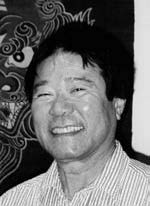By Norman T. Masuda
First Winner, Language Category, 2002
Japan has been in the news the past few months because of the natural and manmade disasters that have occurred in northeastern Japan. During the writing and broadcasting of the calamities that have struck the Japanese people, the news media pointed out the phenomenon of a population that waited patiently for food, water, and medical attention.
Seeing and reading about the Japanese reaction to such devastation, one asks why this reaction and not one of anger and widespread acts of vandalism? It is clear that there are lessons for the world to learn from Japan.
As a third-generation Japanese-American, I grew up with many ties to Japan and Japanese culture. Some of these connections included education about language and culture, interaction with Japanese here and in Japanese-speaking communities, and studying and living in Japan. I have been very fortunate to have developed a good understanding of what it means to be Japanese.
Japan as a society and nation offers many important and valuable traditions and products that have been borrowed (but also indigenous traditions too) since Japan was opened to the West by Commodore Perry and even before. While importation of ideas is often associated with Japan, we think less about the impact that Japan has had on the world and the potential for even greater impact that Japanese society could have on the United States and the rest of the world in the future.
Conversely, Japanese ideas have found their way into other cultures around the globe. Many Japanese words and phrases have found their way into English vocabulary, such as sushi, Zen, futon, tofu, and karate. Among these, Japanese religious practices such as Zen Buddhism and the so-called Dō, or “Way,” have had the most profound influence on Western culture and thinking.
Dō is found in many expressions used in the traditional Japanese arts, both aesthetic and martial. With origins in Daoism and Chan Buddhism in China and Zen Buddhism in Japan, this philosophy of single-mindedness and expanded consciousness is found in teachings of the traditional Japanese arts that all end with the suffix –dō, such as Sadō (tea ceremony), Budō (martial arts), and Kadō (flower arrangement).
This brings us back to the Japanese reaction to adversity and how this practice is embodied in the expression ganbari, or determination and patience. Examples from history are found in the modernization of Japan after the Meiji Restoration in 1868 and the reconstruction of Japan following World War II. Everyone is expected to gambaru (do one’s best and “hang in there”). From early childhood, pupils and students are expected to Gambaru, athletes are encouraged to Gambaru, and workers Gambaru in their job s. This expression does not appear to have an exact equivalent in other languages, and so we must settle for “doing one’s best.”
Together with the Japanese expression Gaman (to be patient and bear hardships), we can see how the Japanese way of thinking can be something for us to study and consider in the West.
I firmly believe that Japan still has many valuable things to offer us and still matters to us. It is up to educators teaching about world cultures to help our students understand concepts that might otherwise be overlooked in the study of Japan and Japanese language and culture.


